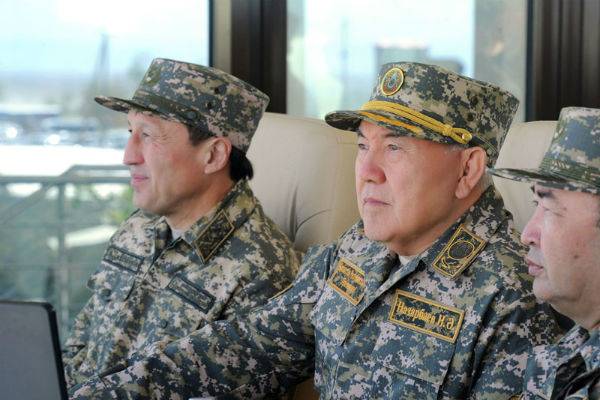
Kazakhstan Moves to Expand, Strengthen National Security Council
Publication: Eurasia Daily Monitor Volume: 15 Issue: 22
By:

Kazakhstan’s parliament introduced new legislation, on January 24, 2018, pertaining to the National Security Council (KNSC) (Abctv.kz, January 24). The legislation notably follows last year’s adoption of a new military strategy, which focuses on ways to strengthen national security and domestic stability (see EDM, October 23, 2017).
The latest document outlines the key responsibilities, structure and legal status of the National Security Council. Although the January 24 law lays out new directives for the KNSC, this body has formally existed since the 1990s, when it was first introduced via presidential decree. During that time, the KNSC’s main task was to advise the head of state on defense and national security issues—namely territorial integrity, sovereignty and stability (Qamzhy.kz, January 24).
Kazakhstan and its post-Soviet neighbors largely inherited the idea of a presidential advisory body on foreign policy and national security from Russia. Indeed, the Kazakhstani document on the KNSC closely emulates Kremlin terminology. However, unlike other National Security Council counterparts present in the United Kingdom, Georgia and the United States, the Kazakhstani Security Council also assists the president with domestic matters, such as political and social stability, as well as addresses human rights and freedoms guaranteed by the Constitution (Tengrinews.kz, March 20, 1999).
The new law introduced last month by the parliament specifically establishes the KNSC as an executive branch body responsible for foreign policy and national security matters. Even though the document greatly repeats the presidential decree of 1999, there are several important points that will significantly change the governance and decision-making process pertaining to issues of national security. As a result, the newly reformed KNSC should reinforce and restructure Kazakhstan’s national security approach in the coming years.
First of all, the Security Council has been transformed from an advisory to a constitutional body. It will now coordinate the implementation of a unified state policy that ensures national security and defense capabilities, preserves political stability, and protects the constitutional order (Kursiv.kz, January 24). According to Urazgali Selteyev, a prominent expert from the Institute of World Economy and Politics Under the President of the Republic of Kazakhstan, the Security Council will become “a key decision-making center with a nomenklatura [key government appointees] leadership” (Inform.kz, January 29).
Another important novelty is the increased number of participants. Starting from three permanent members (the prime minister, the chairman of the National Security Committee and the Council’s secretary) in 1990s, now the total number of KNSC members will be 12. The new law adds the ministers of interior, foreign affairs and defense, as well as the secretary of state, the general prosecutor, the state secretary, the chairs of the parliament’s upper and lower chambers, and the president of Kazakhstan (Nomad.su, January 26). These people will receive service certificates, and their collective decisions will be binding for all other government agencies.
Unsurprisingly, the republic’s first president, Nursultan Nazarbayev, legally reserves the right to chair the Security Council for life. Even though Nazarbayev is preparing to transition out of power by redistributing some of his authorities, he will continue to supervise Kazakhstan’s national security and foreign policy (24.kz, January 24, 2017). This will help him better evaluate his national security team and minimize potential risks when it comes time to choose a successor—presumably from this group.
However, it still remains unclear who will become the next chairperson of the Security Council. Neither the 1999 presidential decree nor last month’s law on the KNSC provides any legal provisions for elections or the authority to nominate a candidate. Currently, only the sitting president is allowed to chair what is becoming the most important and influential executive body of the country. So in this regard, the question of President Nazarbayev’s successor is growing even more complicated.
Another important issue is the division of labor between the Security Council (KNSC) and the National Security Committee. The latter body had, heretofore, been traditionally in charge of national security issues in the country. But no duplication of functions is expected. Rather, the Security Council will coordinate the Committee’s activities. In addition, there is no information regarding how the 1995 Law on National Security Agencies will fit together with the newly proposed legislation (Vlast.kz, January 26).
Though an advisory agency, the KNSC has its own hierarchy and structure. However, the Council importantly remains subordinate to the President’s Office. Notably, Lieutenant General Vladimir Zhumakanov currently holds the dual position of “assistant to the president–Security Council secretary” (Kapital.kz, September 13, 2016). Therefore, it is necessary to highlight some details of the Presidential Office’s personnel and structure. Apart from the general and managerial departments, there are several important divisions within this institution that significantly influence the national decision-making process. For instance, just recently, President Nazarbayev appointed ethnic Russian Alexander Sukhanov as the head of the Analytics Department. Sukhanov earlier chaired the Department of Domestic Policy within the President’s Office (Primeminister.kz, January 24). His predecessor in the Analytics Department, Erkin Tukumov, was assigned to serve as Kazakhstan’s Consul General in Kazan, Russia (Lenta.inform.kz, January 29).
These appointments are just the beginning of the broader expected changes coming to Kazakhstan’s domestic and foreign policy decision making. It is clear that the adoption of the January 2018 law will also result in new appointments and nominees for positions that strongly influence foreign policy and national security matters. And the expanded KNSC, in particular, will require new open-minded people and mid-career professionals who can greatly contribute to the country’s development goals.



